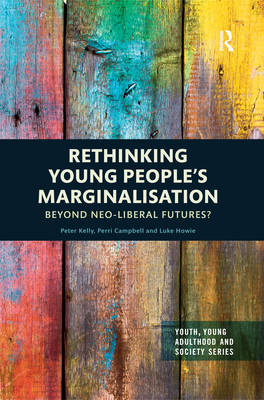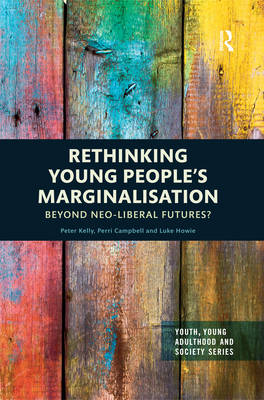
- Afhalen na 1 uur in een winkel met voorraad
- Gratis thuislevering in België
- Ruim aanbod met 7 miljoen producten
- Afhalen na 1 uur in een winkel met voorraad
- Gratis thuislevering in België
- Ruim aanbod met 7 miljoen producten
Rethinking Young People's Marginalisation
Beyond neo-Liberal Futures?
Peter Kelly, Perri Campbell, Luke HowieOmschrijving
In the 21st century myriad earth systems - atmospheric systems, ocean systems, land systems, neo-Liberal capitalism - are in crisis. These crises are deeply related. Taking diverse and multiple forms, they have diverse and multiple consequences and are evidenced in such things as war, everyday violence, hate and extremism, global flows of millions of the dispossessed and homeless; and in the precarious, uncertain, and marginal existence of millions more.
Rethinking Young People's Marginalisation
is concerned with the experience, affect, and effects of these earth systems crises on:- young people's life chances, life choices, and life courses
- young people's engagement with education, training, and work
- the character of young people's being and becoming, their gendered
embodiment, their participation in cultures of democracy, their resilience,
and their marginalisation.
Indeed, in setting out to rethink young people's marginalisation, this insightful volume makes a contribution to troubling key concepts in Youth Studies, primarily: structure and agency; transitions and pathways; gender and embodiment, citizenship, risk, and resilience. It does this by drawing on a variety of critical, theoretical traditions, including Bauman's engagement with the ambivalence of the human condition; Foucault's studies of mentalities of government and genealogies of the subject; the critique of the politics of disposability and violence of neo-Liberalism undertaken by Giroux, and the authors of Kilburn Manifesto;
Braidotti's vitalist posthumanism; and Haraway's figure of the Chthulucene.
Analysing the ways in which young people engage in and develop new cultures of democracy, Rethinking Young People's Marginalisation will appeal to postgraduate students and postdoctoral researchers interested in fields such as Youth Studies, Youth Sociology, Education Studies, and Critical Social Theory.
Specificaties
Betrokkenen
- Auteur(s):
- Uitgeverij:
Inhoud
- Aantal bladzijden:
- 240
- Taal:
- Engels
- Reeks:
Eigenschappen
- Productcode (EAN):
- 9780367556112
- Verschijningsdatum:
- 30/06/2020
- Uitvoering:
- Paperback
- Formaat:
- Trade paperback (VS)
- Afmetingen:
- 155 mm x 231 mm
- Gewicht:
- 376 g

Alleen bij Standaard Boekhandel
Beoordelingen
We publiceren alleen reviews die voldoen aan de voorwaarden voor reviews. Bekijk onze voorwaarden voor reviews.












